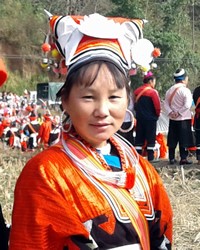Zaomin in China

Photo Source:
Anonymous
|
Send Joshua Project a map of this people group.
|
| People Name: | Zaomin |
| Country: | China |
| 10/40 Window: | Yes |
| Population: | 47,000 |
| World Population: | 47,000 |
| Primary Language: | Dzao Min |
| Primary Religion: | Ethnic Religions |
| Christian Adherents: | 0.70 % |
| Evangelicals: | 0.56 % |
| Scripture: | Translation Needed |
| Ministry Resources: | No |
| Jesus Film: | No |
| Audio Recordings: | Yes |
| People Cluster: | Yao-Mien |
| Affinity Bloc: | Southeast Asian Peoples |
| Progress Level: |
|
Introduction / History
The Zaomin are part of the large Yao nationality. The Chinese call them Bapai Yao, meaning "eight row Yao." Their self-name is Yaomin or Zaomin. The Zaomin "do not consider themselves to be originally of Yao stock, but rather immigrants from the north who became assimilated to the Yao through isolation and the development of common regional interests with the Iu Mien against the Han or Hakka Chinese."
There were already large numbers of Yao living in Guangdong before the start of the Ming Dynasty (1368). Between 1368 and 1566 many Yao were attacked during large-scale military campaigns launched by the Chinese. After 52 separate wars, thousands of Yao fled Guangdong to the west, resulting in the fragmenting of today's Yao subgroups throughout 140 counties of China and into Southeast Asia.
What Are Their Lives Like?
It is the Zaomin women's job to collect firewood. Men say a quick way to find out whether a woman is industrious is to check the fuel piles outside her home. In the event of a divorce, couples share possession of the children. If there is only one child, the person who initiated the divorce loses custody.
What Are Their Beliefs?
The Zaomin have a flood legend common among many Yao groups of how the thunder god opened the "River of Heaven," causing a flood that drowned all of mankind except two people. With the help of the gods, from these two came all the peoples of the world. One story, the Narcissus Girl, tells of a time long ago when there was no separation between the gods and humans. Both could go up and down to visit each other.
Today most Zaomin adhere to a religious mixture that includes Daoist, animist, and Buddhist elements. The Zaomin believe that when they die their moral conduct will have to be accounted for. Numerous songs and chants record what they will be asked. Their answers determine whether their soul will be able to enter into rest or not.
The American Presbyterian missionary H. V. Noyes commenced work in Lianxian in 1872. His church and medical clinic were burned down and five people murdered during a riot in September 1905, caused by missionary interference at a local ghost festival. Some Zaomin in Lianxian have assumed leading positions in the local administration "because of education given to them by the church in the past." In recent decades several Zaomin became Christians in Guangzhou. They returned to their village and led 60 teenagers to Christ.
What Are Their Needs?
People who show they care are always welcome in any community. Loving workers are needed among the Zaomin to tell them about a God who died for them and wants to meet their every need. They need easily available Bibles in their language and workers to teach them Christ's truth.
Prayer Points
Pray for open hearts to receive Christ's truth and a willingness to obey his commands.
Pray for the Lord to thrust out dedicated workers who will not stop until the Zoamin people have disciples who will make more disciples.